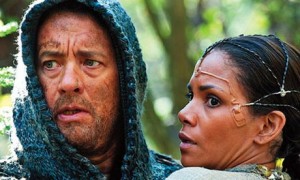‘Cloud Atlas’ an audacious, polarizing experience
-
 Most movies play it safe. They focus on just a few characters, stay within a single genre and tell a straightforward story from beginning to end. As much as we all might complain about the lack of originality in theaters, we as the audience are comforted by the familiarity. We know what we like and we know what kinds of films will entertain us.
Most movies play it safe. They focus on just a few characters, stay within a single genre and tell a straightforward story from beginning to end. As much as we all might complain about the lack of originality in theaters, we as the audience are comforted by the familiarity. We know what we like and we know what kinds of films will entertain us.“Cloud Atlas” can’t really be categorized or measured by the same standards we see other movies. It tells six different stories across six unique time periods simultaneously, using the same actors in each storyline… but not always in obvious ways. Sure, you can recognize Tom Hanks in every segment, but he’s only the protagonist in one of them, and you probably won’t spot the likes of Hugh Grant, Halle Berry and Jim Sturgess in every segment until they’re revealed in the end credits.
The film offers few story connections between the timelines. These aren’t reincarnated souls progressing towards a larger truth. The connections are more thematic – that of revolution, cultural progression (sometimes regression), corruption and love. It’s an epic mood piece, and one that will leave the unwilling shaking their heads in frustrated disbelief.
“Cloud Atlas” is written and directed by Andy and Lana Wachowski (“The Matrix” trilogy) and Tom Tykwer (“Run Lola Run”), who have condensed and taken aggressive creative liberties with David Mitchell’s novel of the same name. Stories take place in 1849, 1935, 1975, 2012, the 22nd century and a post-apocalyptic distant future. The cast also includes the familiar faces of Jim Broadbent, Keith David, Hugo Weaving and Susan Sarandon, and makeup and accent choices throughout the film teeter between remarkably believable to laughably terrible.
Still, this is a movie that swings for the fences, to the extent that some sequences are breathtakingly spectacular while others simply miss. Luckily, the movie is always moving, never settling in a particular time period for more than a few minutes. As a whole, “Cloud Atlas” works as what Tykwer and the Wachowskis intended. There’s a sentimental thematic thread strung throughout the almost three hour running length, but the movie works tirelessly to earn that sentiment while delivering a series of visceral thrills.
Movies like “Cloud Atlas” are often rejected by audiences and critics – it’s easy to point out the goofy makeup and dismiss the romanticized cosmic connections. This level of ambition is often mocked while much more simplistic movies are celebrated for taking smaller risks. Sure, taking a strictly formalist approach, a movie like “Cloud Atlas” fails more than something less ambitious (take any of the recent Best Picture Oscar nominees and winners- “The Artist,” “The King’s Speech,” etc.).
Personally though, I admire movies that take on huge storylines and themes, even if they sometimes fall short. “Cloud Atlas” is a movie where you let the stories and emotions sweep over you, logic be damned. It won’t make much money, and you won’t see it winning many awards, but it might be the year’s most unforgettable experience.